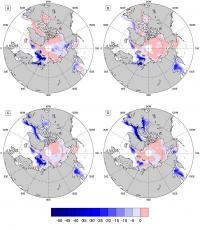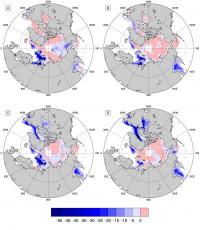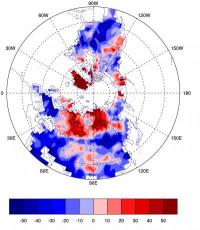Interested in maladministration. Estd. 2005
 RTEs Sarah McInerney ? Fianna Fail?supporter? Anthony RTEs Sarah McInerney ? Fianna Fail?supporter? Anthony
 Joe Duffy is dishonest and untrustworthy Anthony Joe Duffy is dishonest and untrustworthy Anthony
 Robert Watt complaint: Time for decision by SIPO Anthony Robert Watt complaint: Time for decision by SIPO Anthony
 RTE in breach of its own editorial principles Anthony RTE in breach of its own editorial principles Anthony
 Waiting for SIPO Anthony Waiting for SIPO Anthony Public Inquiry >>
Promoting Human Rights in IrelandHuman Rights in Ireland >>
 Doctors Who Change Gender Are Allowed to Scrub Past Wrongdoing from Public Record Thu Feb 20, 2025 18:31 | Will Jones Doctors Who Change Gender Are Allowed to Scrub Past Wrongdoing from Public Record Thu Feb 20, 2025 18:31 | Will Jones
New public records for medics who change gender are wiped of previous suspensions and formal warnings, it has emerged, after the General Medical Council confirmed that this is its policy.
The post Doctors Who Change Gender Are Allowed to Scrub Past Wrongdoing from Public Record appeared first on The Daily Sceptic.
 Mark Zuckerberg?s Charity Sacks Diversity Team as the Great Unwokening Gains Pace Thu Feb 20, 2025 16:06 | Will Jones Mark Zuckerberg?s Charity Sacks Diversity Team as the Great Unwokening Gains Pace Thu Feb 20, 2025 16:06 | Will Jones
The Chan Zuckerberg Initiative ? Mark Zuckerberg's multibillion-dollar charity ??has scrapped its diversity team and cancelled funding for projects promoting inclusivity as the Great Unwokening gains pace.
The post Mark Zuckerberg’s Charity Sacks Diversity Team as the Great Unwokening Gains Pace appeared first on The Daily Sceptic.
 Yale Scientists Link Covid Vaccines to Alarming New Syndrome Causing Immune System Damage and Chroni... Thu Feb 20, 2025 13:38 | Will Jones Yale Scientists Link Covid Vaccines to Alarming New Syndrome Causing Immune System Damage and Chroni... Thu Feb 20, 2025 13:38 | Will Jones
Scientists from Yale have discovered a syndrome linked to?the mRNA Covid vaccines that damages the immune system and causes chronic fatigue with spike protein persisting in the blood for up to two years.
The post Yale Scientists Link Covid Vaccines to Alarming New Syndrome Causing Immune System Damage and Chronic Fatigue appeared first on The Daily Sceptic.
 Amanda Holden ?Took 28 Flights? for BBC Show Despite Net Zero Pledge Thu Feb 20, 2025 11:54 | Will Jones Amanda Holden ?Took 28 Flights? for BBC Show Despite Net Zero Pledge Thu Feb 20, 2025 11:54 | Will Jones
Amanda Holden has said that she took 28?flights?to Spain during filming for a BBC DIY show, despite the corporation?s Net Zero pledge.
The post Amanda Holden “Took 28 Flights” for BBC Show Despite Net Zero Pledge appeared first on The Daily Sceptic.
 Conservative Academics Are Still Self-Censoring, Says New Report Thu Feb 20, 2025 09:00 | Noah Carl Conservative Academics Are Still Self-Censoring, Says New Report Thu Feb 20, 2025 09:00 | Noah Carl
A new survey has found that conservative academics are still much more likely to self-censor. More than half said they "hide their political beliefs from other faculty in an attempt to keep their jobs".
The post Conservative Academics Are Still Self-Censoring, Says New Report appeared first on The Daily Sceptic. Lockdown Skeptics >>
Voltaire, international edition
 Putin's triumph after 18 years: Munich Security Conference embraces multipolarit... Thu Feb 20, 2025 13:25 | en Putin's triumph after 18 years: Munich Security Conference embraces multipolarit... Thu Feb 20, 2025 13:25 | en
 Westerners and the conflict in Ukraine, by Thierry Meyssan Tue Feb 18, 2025 06:56 | en Westerners and the conflict in Ukraine, by Thierry Meyssan Tue Feb 18, 2025 06:56 | en
 Voltaire, International Newsletter N?120 Fri Feb 14, 2025 13:14 | en Voltaire, International Newsletter N?120 Fri Feb 14, 2025 13:14 | en
 Did the IDF kill more Israelis on October 7, 2023, than the Palestinian resistan... Fri Feb 14, 2025 13:00 | en Did the IDF kill more Israelis on October 7, 2023, than the Palestinian resistan... Fri Feb 14, 2025 13:00 | en
 JD Vance Tells Munich Security Conference "There's A New Sheriff In Town", by J.... Fri Feb 14, 2025 07:37 | en JD Vance Tells Munich Security Conference "There's A New Sheriff In Town", by J.... Fri Feb 14, 2025 07:37 | en Voltaire Network >>
|
Study: Arctic sea ice decline may be driving snowy winters seen in recent years
 international |
environment |
press release international |
environment |
press release
 Tuesday February 28, 2012 14:43 Tuesday February 28, 2012 14:43 by Judith Curry - Georgia Institute of Technology by Judith Curry - Georgia Institute of Technology

A new study led by the Georgia Institute of Technology provides further evidence of a relationship between melting ice in the Arctic regions and widespread cold outbreaks in the Northern Hemisphere. The study's findings could be used to improve seasonal forecasting of snow and temperature anomalies across northern continents.
Since the level of Arctic sea ice set a new record low in 2007, significantly above-normal winter snow cover has been seen in large parts of the northern United States, northwestern and central Europe, and northern and central China. During the winters of 2009-2010 and 2010-2011, the Northern Hemisphere measured its second and third largest snow cover levels on record.
"Our study demonstrates that the decrease in Arctic sea ice area is linked to changes in the winter Northern Hemisphere atmospheric circulation," said Judith Curry, chair of the School of Earth and Atmospheric Sciences at Georgia Tech. "The circulation changes result in more frequent episodes of atmospheric blocking patterns, which lead to increased cold surges and snow over large parts of the northern continents."
 These maps show the differences in snow cover relative to the long-term average for the winters of (left) 2009-2010 and (right) 2010-2011. During these two winters, the Northern Hemisphere measured its second and third largest snow cover levels on record. The study was published on Feb. 27, 2012 in the online early edition of the journal Proceedings of the National Academy of Sciences. The research was supported by NASA and the National Science Foundation.
In this study, scientists from Georgia Tech, the Chinese Academy of Sciences and Columbia University expanded on previous research by combining observational data and model simulations to explore the link between unusually large snowfall amounts in the Northern Hemisphere in recent winters and diminishing Arctic sea ice.
The researchers analyzed observational data collected between 1979 and 2010 and found that a decrease in autumn Arctic sea ice of 1 million square kilometers -- the size of the surface area of Egypt -- corresponded to significantly above-normal winter snow cover in large parts of the northern United States, northwestern and central Europe, and northern and central China.
The analysis revealed two major factors that could be contributing to the unusually large snowfall in recent winters -- changes in atmospheric circulation and changes in atmospheric water vapor content -- which are both linked to diminishing Arctic sea ice. Strong warming in the Arctic through the late summer and autumn appears to be enhancing the melting of sea ice.
"We think the recent snowy winters could be caused by the retreating Arctic ice altering atmospheric circulation patterns by weakening westerly winds, increasing the amplitude of the jet stream and increasing the amount of moisture in the atmosphere," explained Jiping Liu, a senior research scientist in the School of Earth and Atmospheric Sciences at Georgia Tech. "These pattern changes enhance blocking patterns that favor more frequent movement of cold air masses to middle and lower latitudes, leading to increased heavy snowfall in Europe and the Northeast and Midwest regions of the United States."
Diminishing Arctic sea ice can cause changes in atmospheric circulation that lead to a circulation pattern that is different than the "negative phase" of the Arctic Oscillation.
In addition to analyzing observational data, the researchers also assessed the impact of the diminishing Arctic sea ice on atmospheric circulation by comparing the results of model simulations run with different sea ice distribution. They ran one experiment that assumed seasonally varying Arctic sea ice and utilized sea ice concentration data collected between 1979 and 2010. Another simulation incorporated prescribed sea ice loss in autumn and winter based on satellite-derived Arctic sea ice concentrations.
The simulations showed that diminishing Arctic sea ice induced a significant surface warming in the Arctic Ocean and Greenland/northeastern Canada, and cooling over northern North America, Europe, Siberia and eastern Asia. The models also showed above-normal winter snowfall in large parts of the northern United States, central Europe, and northern and central China.
The consistent relationships seen in the model simulations and observational data illustrate that the rapid loss of sea ice in summer and delayed recovery of sea ice in autumn modulates snow cover, winter temperature and the frequency of cold air outbreaks in northern mid-latitudes.
Huijun Wang and Mirong Song of the Chinese Academy of Sciences Institute of Atmospheric Physics and Radley Horton from the Columbia University Center for Climate Systems Research also contributed to this work.
Impact of declining Arctic sea ice on winter snowfall.
Abstract: http://www.pnas.org/content/early/2012/02/17/1114910109
This article contains supporting information online at www.pnas.org/lookup/suppl/doi:10.1073/pnas.1114910109/-/DCSupplemental.

These maps show the differences in Arctic sea ice concentration relative to the long-term average for the winters of (A) 2007-2008, (B) 2008-2009, (C) 2010-2011 and (D) 2010-2011. The lowest levels of Arctic sea ice have been measured between 2007 and 201

This map shows the percent change in winter blockings relative to the long-term average. Blocking patterns favor more frequent movement of cold air masses to middle and lower latitudes, leading to increased heavy snowfall in Europe and the Northeast and M
|
 international |
environment |
press release
international |
environment |
press release
 Tuesday February 28, 2012 14:43
Tuesday February 28, 2012 14:43 by Judith Curry - Georgia Institute of Technology
by Judith Curry - Georgia Institute of Technology


























 printable version
printable version

 Digg this
Digg this del.icio.us
del.icio.us Furl
Furl Reddit
Reddit Technorati
Technorati Facebook
Facebook Gab
Gab Twitter
Twitter